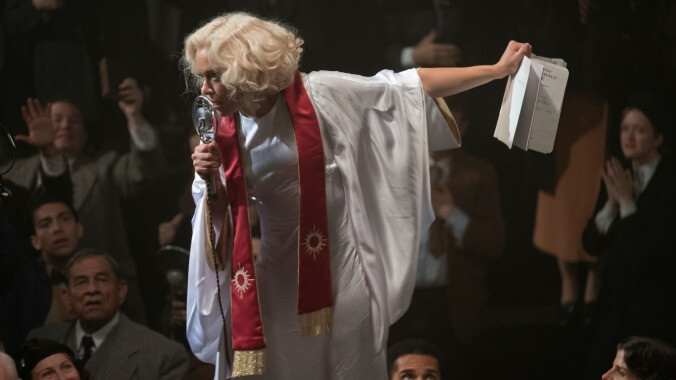Perry Mason really arrives in the case of the frightful penmanship

Well, that’s a stark difference in tone—and is it ever welcome. It’s an odd thing to say about an episode that begins with Della (Juliet Rylance) finding the dead body of someone very close to her in circumstances that are more than a bit traumatic, and odder still to say about a series that begins with a dead baby with stitched-open eyes, but this is the first episode in which Perry Mason has been undeniably fun. Still grim, yes, and still packed with great performances and quiet menace (more than usual, even), but that’s still the best word for it: It was fun.
Much of the credit for that is due to the lively teleplay by credited writer Eleanor Burgess. It doesn’t diminish or skate past the heavy emotional stuff, and actually gives Rylance, Matthew Rhys, Gayle Rankin, Shea Whigham, Chris Chalk, Tatiana Maslany, and Lili Taylor all some solid, subtle, meaty scenes to play. (It also gives Maslany the chance to do a little light speaking in tongues. No complaints there.) Burgess’s confident script doesn’t feel any flimsier for all its welcome buoyancy, and instead gives the impression that somehow the show we’re watching has finally and fully arrived.
Please don’t let my enthusiastic use of the word ‘fun’ (with italics and everything!) give the impression that those early scenes are jam-packed with hijinks or something. As mentioned above, the episode opens with Della discovering E.B.’s body, a tense, mournful sequence that, once Perry arrives, becomes a silent act of love. A complicated one, but an act of love nonetheless.
This is a great episode for Juliet Rylance, whose Della not only anchors that excellent opening sequence but also gets some solid comic beats, a handful of complex little character-developing scenes, and (most importantly) the biggest lightbulb moment of the series so far. Della’s first move—besides turning off the gas and doing some horrified grieving—is to call Perry, who arrives on E.B.’s doorstep, ready to “turn [his suicide into something more respectable.” It’s the kind of scene that says more about a relationship than any dialogue could, as Perry and a weeping Della hug*, then get to work moving E.B.’s body from the kitchen to the bedroom, from a suit to pajamas, and from bloodied and staring to serene.
It’s the transition from that scene to the next that exemplifies the excellent tonal balance this episode achieves. First we hear Della’s voice, monologuing about the surreality of knowing you’ll never again see someone you once saw every day, and it seems as though she and Perry have gone somewhere to mourn and maybe share a drink. (Well, Perry would for sure drink.) But we then see that she’s speaking to a representative of E.B.’s life insurance firm, and his response is a very polite take on “Sir, this is a Wendy’s.” And once again, what we see tells us a great deal. Not only does it set up the clever, almost effervescent energy of the episode, it also allows us to see Della’s emotional state (she’s pouring her heart out to the insurance guy) while also hinting at the indifferent funeral to come.
When Perry and Della do finally get to have that drink and do some reminiscing, it’s only the second of the several excellent scenes Rhys and Rylance get to play in “Chapter Five.” Each underlines a different, sometimes seemingly contradictory aspect of their relationship. When Della finds E.B., Perry is her first phone call. When he says that there’s “what’s legal and what’s right,” she replies with a gentle jab about how his self-destructive tendencies are the shield behind which he hides his intelligence and decency; she later repeats the line when explaining her decision to hide vital notes and evidence from the lawyer thrust upon Emily (Rankin) and by extension Della. When Perry just doesn’t show up for their journey back to L.A. in the morning Della’s disappointed but not surprised; when he begins to address an imagined jury, she listens, delighted, while typing up the letter outlining Perry’s “apprenticeship.” Each is a little piece of truth about that relationship, and once again, theirs is a connection far more complex than the one in Gardner’s novels.
Each is also an example of what a knack both Rylance and especially Rhys have with a good line of dialogue. Take the marvelous lightbulb scene, in which a grandstanding Perry inspires Della to fake the paperwork that will send Perry down the road that made the character famous. Perry gets really wound up, works up a big head of steam, and then a wryly amused Della asks Perry if he wants coffee.
“I’ve got coffee.”

 Keep scrolling for more great stories.
Keep scrolling for more great stories.